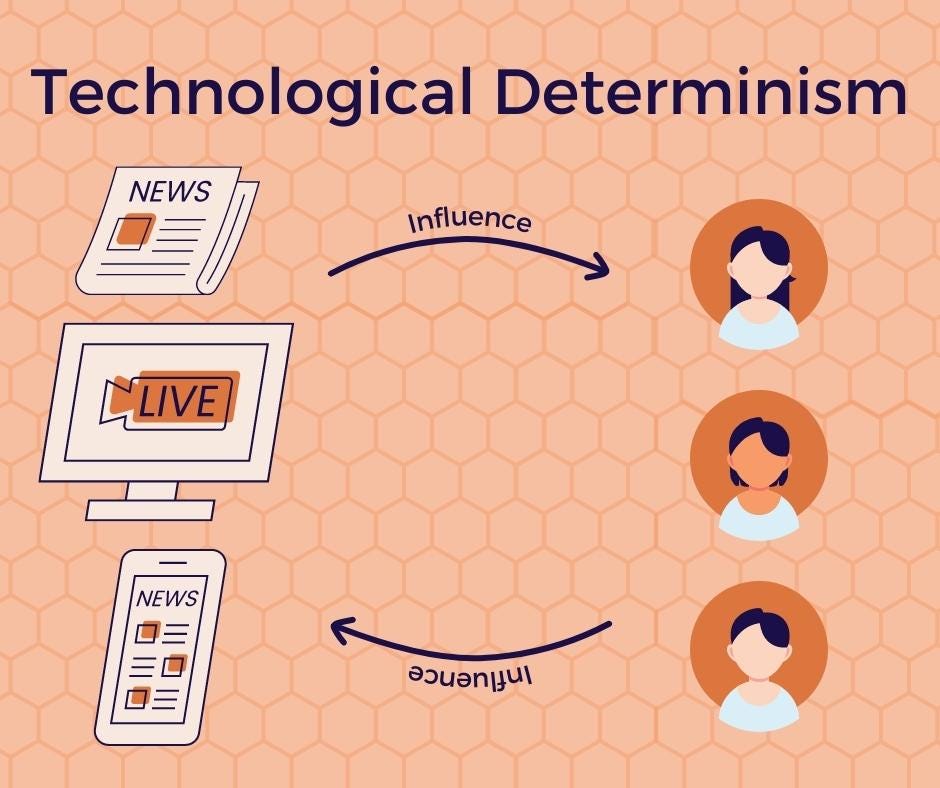Riding the Technological Thunderstorm: A Flash Look at Culture with Marshall McLuhan's Ideas
 Ian Snyder
Ian SnyderIn the wild world of technology, think of Marshall McLuhan as a storm ringer, as his ideas are like a thunderstorm, shaking things up and bringing a fresh start to how we see our cultural phenomenon of technological innovation. as we navigate the storm of technological ideas, McLuhan is a rainmaker showering us with possibilities. In a flash, let's explore two exciting parts and three things to watch out for in McLuhan's ideas using the metaphor of a thunderstorm. What better way to rein in the ideas of technological determinism than equating it to a thunderstorm metaphor? I hope you enjoy my cheesy lines about thunderstorms and electricity, and learn something before you click away!
Parts of Technological Determinism
The Global Village
McLuhan's idea of a global village is like a lightning bolt hitting the whole world at once. It's about electronic media connecting us globally and making us feel closer together and interconnected at all times. I like to think of it like an electric charge that brings a sense of togetherness, rather than bringing you the 60 Hertz shuffle (electricians will get this one). In particular, Mcluhan says that television "...has transformed the world into an interconnected tribe called a global village". In this way, he also depicts that all technology is communication. and allows us to extend ourselves As far as we need or want to and be available as long as we need or want to to the greater world around us. Unfortunately, the advantages that come with having this technology and communication and interconnectedness right at our fingertips every day also can cause experiences of detachment and conflict. You may find yourself mindlessly scrolling TikTok, Reddit or another social media page, or you may find yourself constantly posting or interacting with the world around you, even when it's not necessarily beneficial or in your best interest to do so.
Looking at the graphic below, essentially the people influenced the technology, which in turn influences the people yet again.

Medium is the Message
Understanding the "medium is the message" (click that link to see a video explaining the paradoxical nature of the statement) is like realizing the thunderstorm shapes the land. McLuhan is saying that how we communicate shapes our culture, and it's like recognizing the electric storm will leave a mark on the cultural soil every time lightning passes through. McLuhan also posits a value of hot or cool to the level of interactivity with a given medium. Mediums that require less interactivity or considered hot as people don't or can't touch them. Things like television and film can easily fall into this category because unless you're the one making the film or the TV show, you're not having any level of interactivity with that content. Rather, you're a passive observer or an audience member. In contrast, things like video games use this communication are considered cold because they are typically purely interactivity-driven content mediums for entertainment and also carry/communicate messages within them.
If you're interested in a more long-form video than the short link I posted above, which covers the idea that the medium is the message, check out this great analysis from Theory & Philosophy on YouTube:
Things to Watch Out For
Too Much Focus on Technology
While the thunderstorm of technology brings a fresh association to our culture, focusing too much on it can flood our thoughts and even ruin our relationships. McLuhan's focus may cover up the inner workings of how society grows and potentially drown out the other important perspectives around us. As technology grows and evolves, society will have an increasing reliance on it for all sorts of different functions. We can even see this concept at work now, where we have a (perceived) over-reliance on technology for things as simple as shopping at the grocery store or even sitting at home with our devices.
Simplifying How Media Affects Us
The thunderstorm, though exciting, might make things too simple. McLuhan's idea might not capture all the complex things happening, possibly leading to misunderstandings about our culture. In essence, Mcluhan primarily deals with the idea that technology is constantly being used and is constantly growing and has. an effect on our society as the global village that I mentioned previously, however, it doesn't necessarily dive into the deeply interconnected nature that technology has in our society. For that, we may have to turn to several other media and communicative theories that dive deeper into specific issues.
Not Always Predictable
A thunderstorm also may not follow a clear path. We know the weatherman sometimes gets these things wrong. Much like the thunderstorm, McLuhan's ideas and his way of thinking may not always predict where technology goes. The unexpected outcomes may challenge how clear we think the storm's direction is. So while McLuhan's theories tell us where we are currently in the technological world, it may be difficult to predict the future and tell us where we are going in terms of our technological use, what technologies are arising or on the cusp of arising and what technologies may die and not be used as much in the future. It's best to think of McLuhan's theory as a theory of understanding the world around us and how. technology is used by the people and why it is used by the people, as well as the positive/negative effect it may have on society and individuals.
For example, everyone assumes technology helps us increase our productivity, but take a look at this chart examining the uncertainty behind that statement:

Of course, this is particular to the nonfarm business sector, however, the implications are clear that productivity does not necessarily follow a linear curve of growth...at least in the relatively short-term.
Balancing the Storm's Energy with Unpredictability
McLuhan's ideas, much like a thunderstorm, bring energy in a fresh perspective. They invigorate how we see our culture, much like a good rain after a storm can make things grow and flourish. But, just as the thunderstorms weather can surprise us, McLuhan's ideas might lead us to unexpected places. Handling this means finding a balance between the exciting energy the ideas bring and being ready for the surprises in how technology will grow and evolve.
In this technological thunderstorm, Marshall McLuhan's ideas act like lightning and rain. they light up new ways of thinking and bring a refreshing start to how we see our culture. As we move through the storm of technological ideas, let's be aware of the potential surprises, navigate with care, and appreciate the exciting energy that this thunderstorm of ideas brings. the way we see our cultural landscape may just balloon with new possibilities, just like the land after a good storm.
Subscribe to my newsletter
Read articles from Ian Snyder directly inside your inbox. Subscribe to the newsletter, and don't miss out.
Written by
